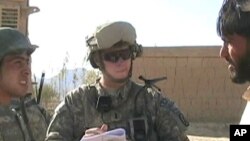U.S. President Barack Obama plans to announce his new strategy for Afghanistan on Tuesday, and U.S. news organizations say he will most likely send between 30,000 and 35,000 additional troops. The top U.S. and NATO commander in Afghanistan earlier this year told the president that up to 40,000 additional troops are needed to combat Taliban and al-Qaida militants in the region. If General McChrystal does not get all of the troops that he seeks, U.S. commanders are already trying to make do with fewer numbers.
Soldiers from the U.S. Army's 10th Mountain Division patrol Baraki Barak district, in Logar province, 80 kilometers south of Kabul.
Logar is a key agricultural province and a test case for U.S. troops now in Afghanistan in case President Barack Obama does not approve thousands of reinforcements.
The senior U.S. officer in Logar, Army Lt. Col. Thomas Gukeisen, tells Voice of America that he does not have enough soldiers to control all of the province, even with the help of the Afghan National Army (ANA) and the Afghan National Police (ANP).
Instead, he uses the troops that he has to occupy the most cooperative villages, and turn them into examples for neighboring villages to follow. The troops provide a security bubble for reconstruction projects in the targeted communities.
"Outside of that bubble, you create dislocated envy," said Colonel Gukeisen. "You have people outside - the elders and children - say well how come my school wasn't fixed. For instance, one village, Shamazar, came forward and said we want this. We said, 'Well, you've had 18 IEDs in your village and outside your village. We know you know who's doing it. You're not telling us.'"
The idea is for the Afghan communities to police themselves, in order to qualify for reconstruction projects. The aim is to extend security beyond the U.S.-controlled villages.
One of Colonel Gukeisen's platoons met recently with farmers in Ibed.
"We're conducting agricultural and veterinary surveys for locals in the village of Ibed, outside the security bubble, in hopes of enticing some farmers to come to the district center - and, if they do, it will give us a chance to show that these are services that ourselves in conjunction with the ANA can provide to them. Hopefully we can turn them into a pro-coalition village," explained Army 1st Lieutenant Sean Mahard.
Colonel Gukeisen's says the approach worked before. In Iraq four years ago, a small number of U.S. Marines were able to spread security across most of the country's west, by first concentrating in the most pro-American communities. They called their approach, the "ink-spot" strategy.
But Afghanistan is not Iraq, and it is not clear that ink spots will work the same way here. For one, Afghanistan is a bigger and more rugged country.
Plus, the Taliban have a say. And in Logar, as elsewhere in Afghanistan, major violence often disrupts U.S. plans.




